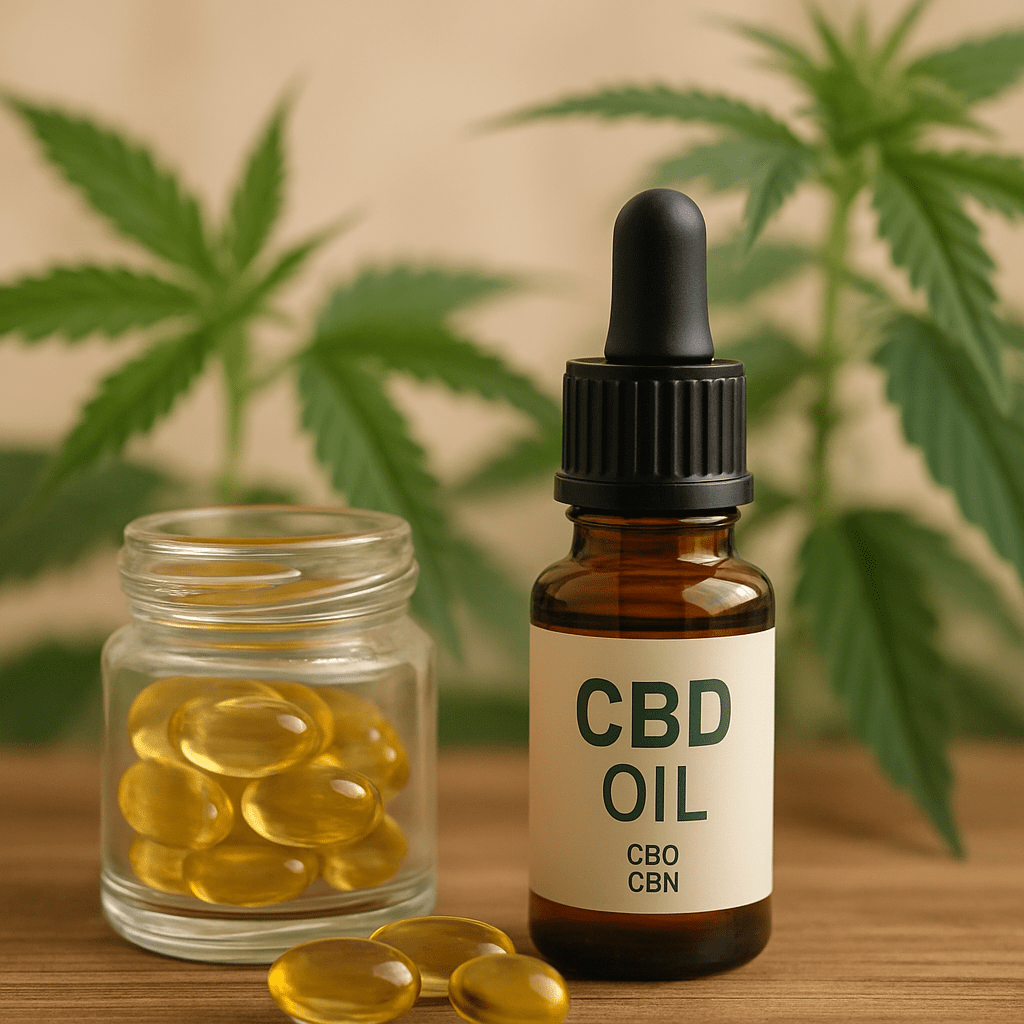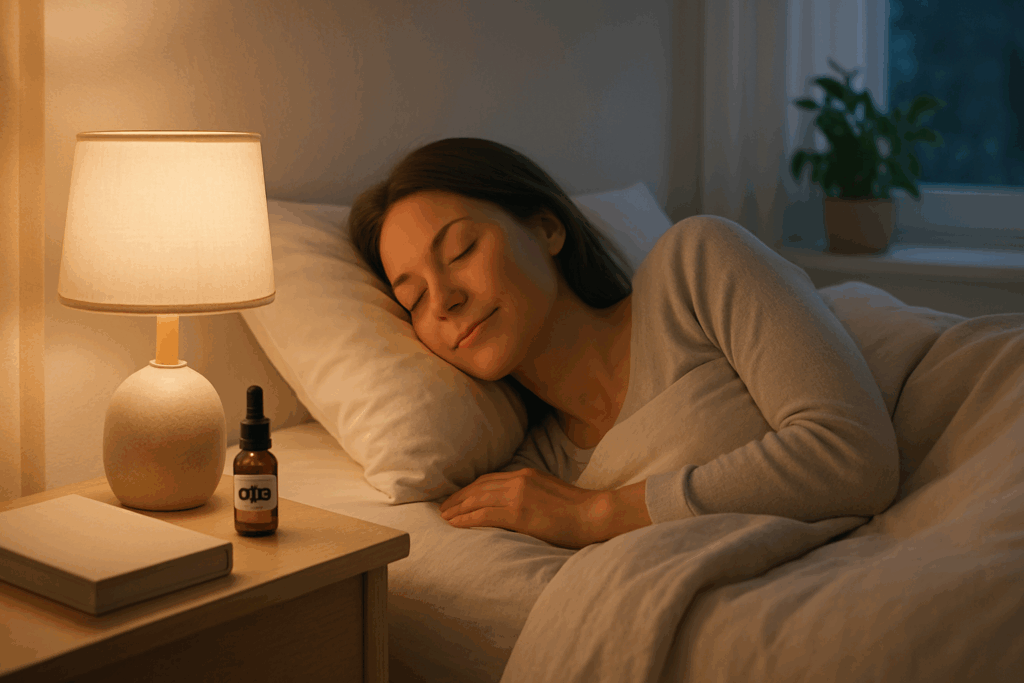At a time when sleep disorders affect nearly one in five French people, natural solutions are generating increasing interest. Among them, cannabidiol, more commonly known as CBD, is emerging as a promising alternative for improving sleep quality. Without the psychotropic effects of THC, this compound extracted from hemp is appealing due to its relaxing, anxiolytic, and calming properties. In 2025, research continues to refine our understanding of its mechanisms of action and confirm its potential in combating insomnia and nighttime awakenings. What is the scientific evidence, what are the practical applications, and what are the usage recommendations? This report explores in depth how CBD acts on our bodies to promote peaceful and restorative nights.
Sommaire
ToggleSeveral questions remain at the forefront of current discussions: Is CBD truly effective for falling asleep? What are the best dosages and times to consume it? How does it differ from other cannabinoids such as CBN, known as the “sleep cannabinoid”? Finally, how can CBD be used in conjunction with medication? These are all crucial aspects for understanding this natural treatment that combines well-being, brain wave regulation, and harmony of the endocannabinoid system. Let’s delve into the complex and fascinating world of cannabidiol and its impact on sleep.
The crucial role of cannabidiol in the natural management of insomnia Scientific research in 2025 confirms that
cannabidiol CBD plays a vital role in the natural management of sleep disorders. Recent data from controlled clinical trials and observational studies indicate that CBD may facilitate falling asleep and reduce nighttime awakenings, two major problems associated with insomnia. While conventional pharmaceuticals often present undesirable side effects or a risk of addiction, CBD offers an alternative with a better tolerability profile.CBD works primarily by modulating the endocannabinoid system, a key component in regulating sleep and stress responses. This system helps maintain internal balance, also known as homeostasis, by influencing neurotransmitters and hormones involved in sleep-wake cycles. Thus, by reducing anxiety and stress, cannabidiol creates an environment conducive to relaxation and the mental calm essential for falling asleep quickly.
- Furthermore, CBD’s soothing effect also stems from its ability to alleviate muscle and joint pain that can disrupt sleep. It also acts on brain waves, promoting a more regular rhythm and deeper, restorative sleep. Numerous user testimonials confirm this, reporting a significant reduction in chronic insomnia after several weeks of regular CBD use. Reduction of stress and anxiety
- —a major factor in sleep disorders. Improved quality of deep sleep
- thanks to a relaxing effect on the brain.Reduction of nighttime awakenings
- allowing for continuous and restorative rest. No risk of addiction or psychoactive effects
- unlike THC. Wide variety of formats
: oils, capsules, gummies for a customized approach to individual needs.

Discover how cannabidiol (CBD) can improve your sleep quality and relieve associated sleep disorders thanks to its calming and relaxing properties.
Understanding how CBD affects sleep phases for deep rest
Sleep is a complex phenomenon composed of several alternating phases: light sleep, deep sleep, and REM sleep. The effectiveness of a natural treatment like CBD depends largely on its ability to positively influence these phases, thereby increasing the time spent in restorative sleep. Current research suggests that cannabidiol acts indirectly on circadian rhythms, the internal biological clock that manages the balance between wakefulness and rest. Although CBD does not directly alter the natural production of melatonin, a key hormone in synchronizing the day-night cycle, it can improve feelings of calm and reduce the mental rumination often responsible for nighttime awakenings.
- CBD’s anxiolytic and mild sedative properties act on brain waves, promoting an alpha or theta state conducive to deep relaxation. This modulation of brain waves plays a fundamental role in achieving and maintaining deep sleep without unnecessary interruptions. Cannabidiol therefore works by facilitating the transition to a lasting state of relaxation and improved emotional balance. Supports the regulation of the circadian rhythm
- without disrupting melatonin. Promotes the reduction of beta waves
- associated with stress and mental agitation. Increases alpha and theta waves.
- which aid in mental and physical relaxation. Reduction of anxiety-related awakening reflexes
- for a more uninterrupted night’s sleep. Possible synergistic effect with other natural components
such as lavender and ylang-ylang.
https://www.youtube.com/watch?v=1qwiY_jtXdc Differences between CBD and CBN: understanding their respective roles in sleep aids While CBD is now widely recognized for its relaxing and anxiolytic effects,
CBN
or cannabinol is emerging as a crucial complementary ally in the quest for restful sleep. It is often described as the “sleep cannabinoid” due to its more pronounced sedative properties resulting from its gradual formation through the breakdown of THC.
- Unlike THC, which produces psychoactive effects, CBN is non-euphoric and supported by initial studies as an effective solution for insomnia. While CBD works by modulating anxiety and inducing a state of calm, CBN acts as a direct facilitator of deep sleep thanks to its sedative effects, which can help reduce the time it takes to fall asleep and improve sleep continuity.
- Here is a comparative overview of the functions of these two cannabinoids:
- CBD: anti-anxiety, anti-inflammatory, promotes relaxation without significant drowsiness. CBN: more potent sedative effect, facilitates deep and prolonged sleep.
- Synergy: their combination in certain products enhances the natural treatment of sleep disorders. Different origins
- CBD comes directly from the plant, while CBN is formed after the breakdown of THC.
No psychoactive effects: Both cannabinoids are safe for daily use.

Discover how cannabidiol (CBD) can improve your sleep quality by reducing stress and promoting natural relaxation.
Practical tips for incorporating CBD into your evening routine and appropriate dosages To fully benefit from the effects of CBD on sleep quality, it’s important to integrate it intelligently into your nighttime routine. According to research and user experience, the optimal time to consume CBD is generally between 30 and 60 minutes before bedtime. This delay allows the body to absorb and assimilate the cannabidiol, while preparing the body for a state of relaxation conducive to falling asleep.
It is advisable to adjust the dose according to the product used, the CBD concentration, and individual needs. For example:
- CBD Oils : For a 5% concentration oil, the dose can vary from 10 to 40 drops divided into two doses in the evening (late afternoon and just before bed).
- Capsules : Generally dosed around 25 mg of CBD (often combined with CBN or melatonin), it is possible to start with one or two capsules per night.
- Lozenges : Convenient format for occasional insomnia, one lozenge per day is often sufficient for an effective effect.
The choice of format depends on taste, convenience, and personal preference. For those who don’t enjoy the taste of hemp, CBD capsules or gummies offer a more pleasant alternative. Furthermore, combining CBD intake with a relaxing ritual, such as quiet reading or a meditation session, can enhance its beneficial effects.
Dosage monitoring is essential: the European Food Safety Authority (EFSA) recommends not exceeding 50 mg of cannabidiol per day to avoid potential side effects. It’s also important to pay attention to your own body’s reactions and adjust the dosage gradually.
- Consume CBD 30 to 60 minutes before bedtime for optimal effect.
- Adjust the dose according to the format and concentration of the chosen product.
- Prioritize regular use for better sleep balance.
- Avoid combining with alcohol or other sedatives without medical advice.
- Consult a healthcare professional if you are currently taking medication . https://www.youtube.com/watch?v=5R3e9QO6-WY
Despite its generally favorable profile, cannabidiol is not without precautions for use. In 2025, vigilance remains essential, especially for individuals undergoing medical treatment or suffering from specific medical conditions.
Sleep-related side effects of CBD, while rare, can include a dry mouth, occasional daytime sleepiness, or slightly more pronounced fatigue upon waking. These inconveniences often lessen after dosage adjustment or gradual adaptation.
More concerning are the potential interactions with certain medications, particularly those metabolized by the liver, such as some antidepressants, antifungals, or anticoagulants. CBD can alter their effectiveness, either increasing or decreasing their effects. Therefore, it is essential to consult a healthcare professional before starting a CBD regimen to avoid any risk of adverse interactions.
Common side effects:
- dry mouth, mild headaches, temporary fatigue.
- No addiction or withdrawal syndrome observed, a major advantage compared to conventional medications.
- Possible drug interactions with certain common treatments. Extra caution is advised for pregnant or breastfeeding women, or those with underlying health conditions.
- Medical supervision is crucial for safe and appropriate use. By adhering to these recommendations, cannabidiol can become a lasting and effective natural aid in managing sleep disorders, reducing stress and anxiety, and promoting deep rest without compromising the next day’s energy levels.




